Nursing Communication Styles Report: Assessment and Reflection
VerifiedAdded on 2022/10/17
|9
|2226
|17
Report
AI Summary
This report is a comprehensive self-assessment of a nursing student's communication style, based on the "What's My Communication Style?" assessment. The report identifies the student's communication styles as considerate and systematic, exploring the positive aspects of these styles, such as being a good listener, counselor, and precise decision-maker. The report also provides examples of how these strengths benefit communication and offers strategies for strengthening listening skills and improving supportive language. Furthermore, the report addresses potential weaknesses in teamwork and personal interactions, offering solutions like self-expression and empathy. The student reflects on the importance of communication styles in preventing medical errors and enhancing patient care, emphasizing the role of effective communication in teamwork and breaking bad news. The report concludes with a discussion of challenges and strategies to overcome them, highlighting the significance of communication styles in the healthcare sector for improving both patient and practitioner satisfaction. The student has cited several references to support the arguments and suggestions in the report.
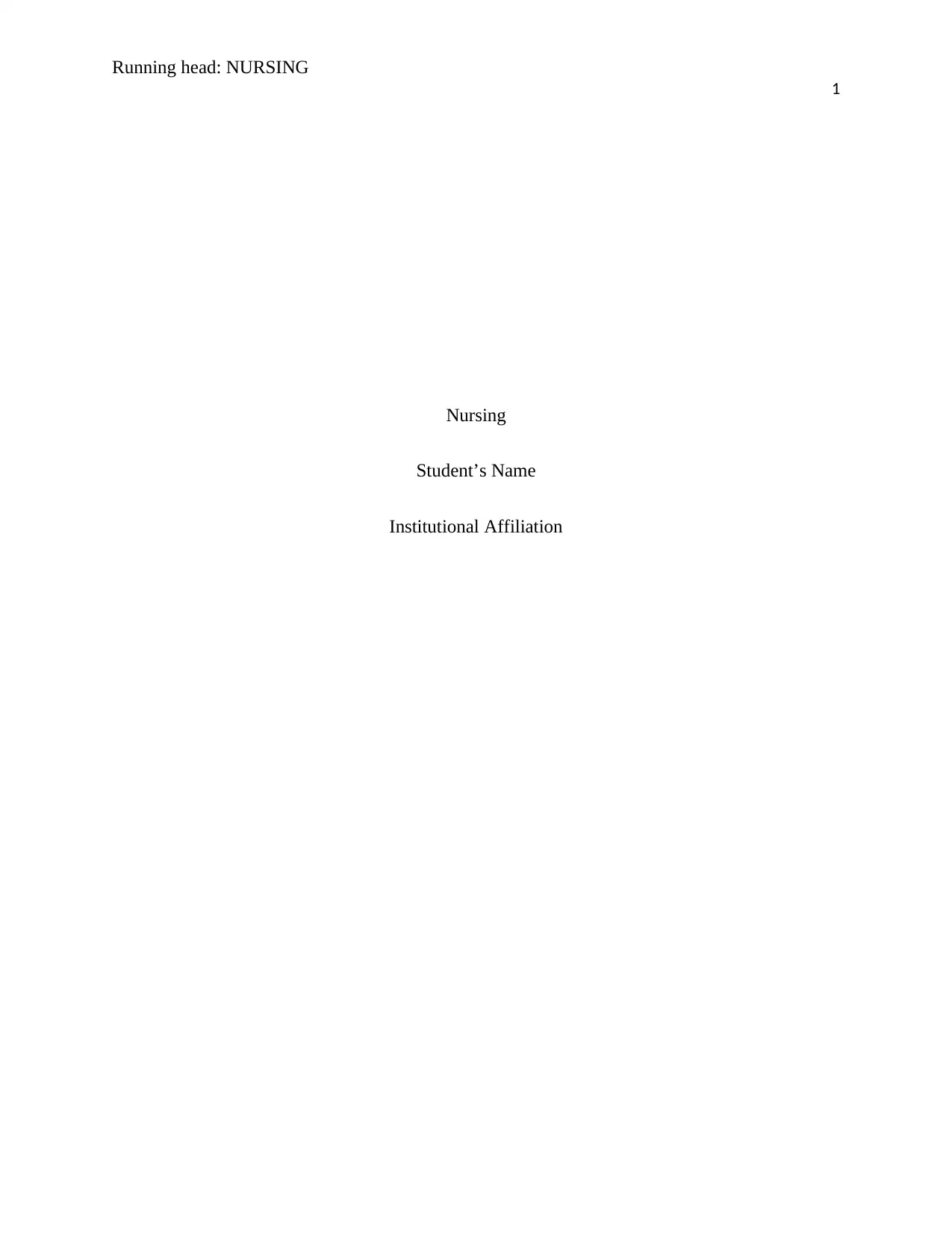
Running head: NURSING
1
Nursing
Student’s Name
Institutional Affiliation
1
Nursing
Student’s Name
Institutional Affiliation
Paraphrase This Document
Need a fresh take? Get an instant paraphrase of this document with our AI Paraphraser
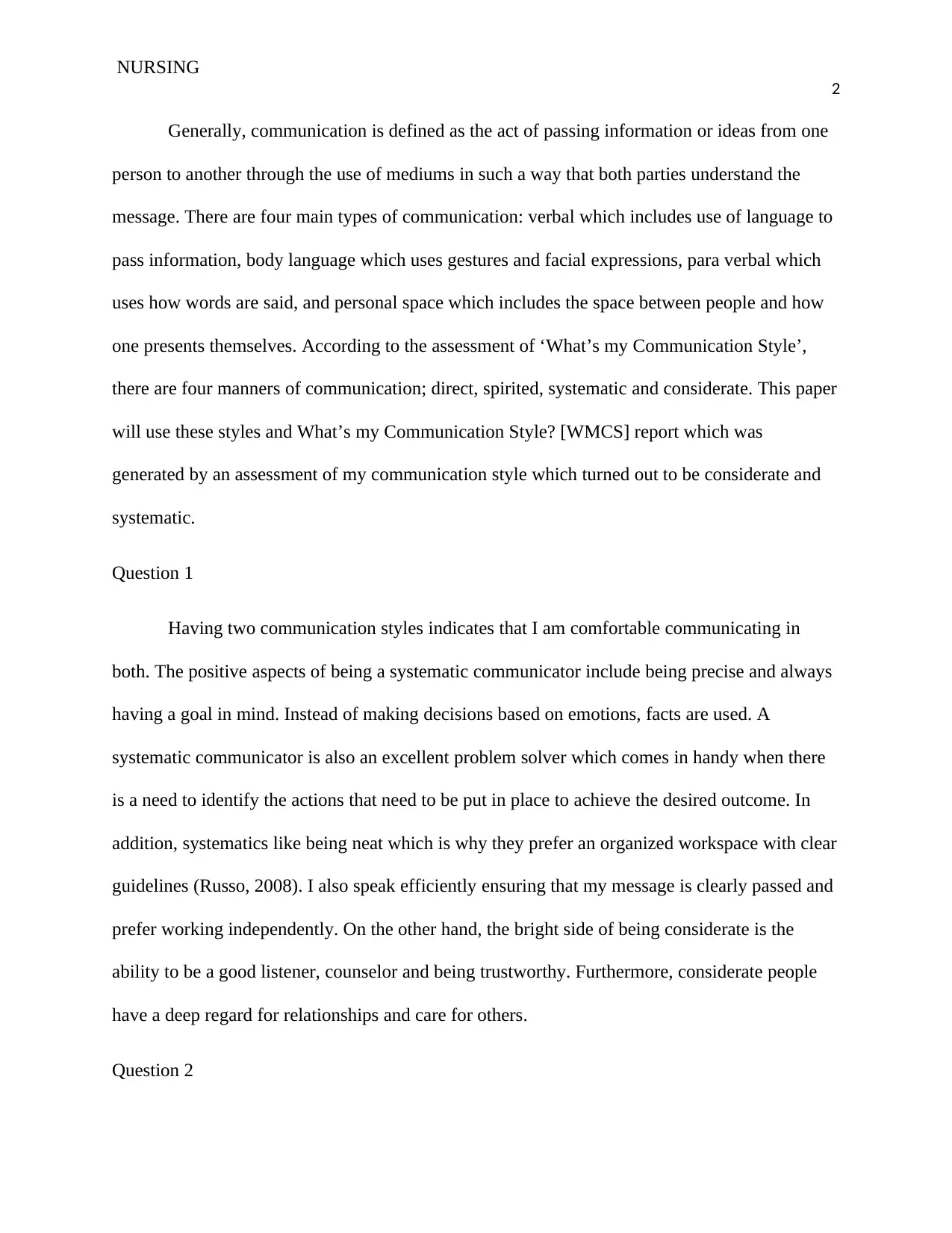
NURSING
2
Generally, communication is defined as the act of passing information or ideas from one
person to another through the use of mediums in such a way that both parties understand the
message. There are four main types of communication: verbal which includes use of language to
pass information, body language which uses gestures and facial expressions, para verbal which
uses how words are said, and personal space which includes the space between people and how
one presents themselves. According to the assessment of ‘What’s my Communication Style’,
there are four manners of communication; direct, spirited, systematic and considerate. This paper
will use these styles and What’s my Communication Style? [WMCS] report which was
generated by an assessment of my communication style which turned out to be considerate and
systematic.
Question 1
Having two communication styles indicates that I am comfortable communicating in
both. The positive aspects of being a systematic communicator include being precise and always
having a goal in mind. Instead of making decisions based on emotions, facts are used. A
systematic communicator is also an excellent problem solver which comes in handy when there
is a need to identify the actions that need to be put in place to achieve the desired outcome. In
addition, systematics like being neat which is why they prefer an organized workspace with clear
guidelines (Russo, 2008). I also speak efficiently ensuring that my message is clearly passed and
prefer working independently. On the other hand, the bright side of being considerate is the
ability to be a good listener, counselor and being trustworthy. Furthermore, considerate people
have a deep regard for relationships and care for others.
Question 2
2
Generally, communication is defined as the act of passing information or ideas from one
person to another through the use of mediums in such a way that both parties understand the
message. There are four main types of communication: verbal which includes use of language to
pass information, body language which uses gestures and facial expressions, para verbal which
uses how words are said, and personal space which includes the space between people and how
one presents themselves. According to the assessment of ‘What’s my Communication Style’,
there are four manners of communication; direct, spirited, systematic and considerate. This paper
will use these styles and What’s my Communication Style? [WMCS] report which was
generated by an assessment of my communication style which turned out to be considerate and
systematic.
Question 1
Having two communication styles indicates that I am comfortable communicating in
both. The positive aspects of being a systematic communicator include being precise and always
having a goal in mind. Instead of making decisions based on emotions, facts are used. A
systematic communicator is also an excellent problem solver which comes in handy when there
is a need to identify the actions that need to be put in place to achieve the desired outcome. In
addition, systematics like being neat which is why they prefer an organized workspace with clear
guidelines (Russo, 2008). I also speak efficiently ensuring that my message is clearly passed and
prefer working independently. On the other hand, the bright side of being considerate is the
ability to be a good listener, counselor and being trustworthy. Furthermore, considerate people
have a deep regard for relationships and care for others.
Question 2
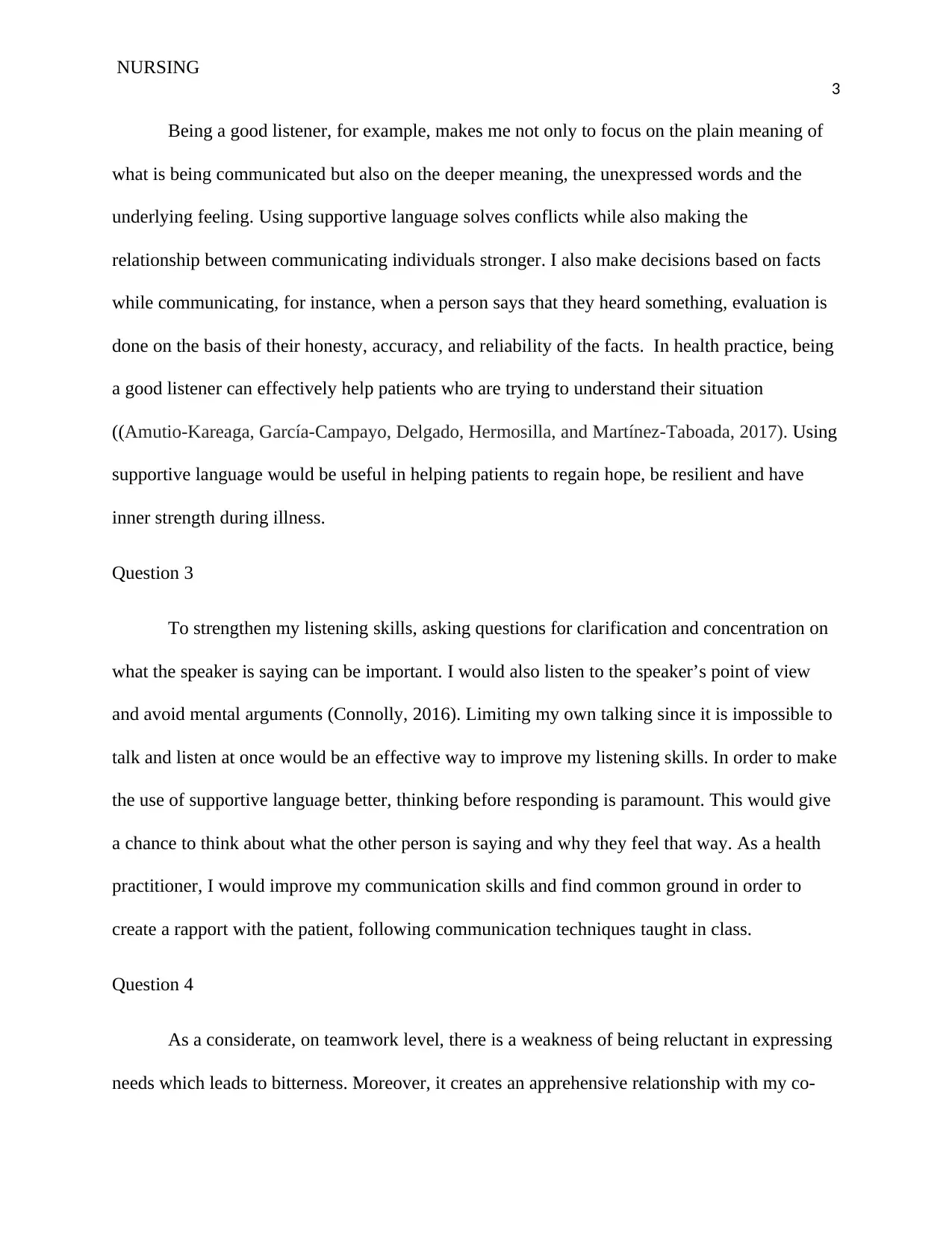
NURSING
3
Being a good listener, for example, makes me not only to focus on the plain meaning of
what is being communicated but also on the deeper meaning, the unexpressed words and the
underlying feeling. Using supportive language solves conflicts while also making the
relationship between communicating individuals stronger. I also make decisions based on facts
while communicating, for instance, when a person says that they heard something, evaluation is
done on the basis of their honesty, accuracy, and reliability of the facts. In health practice, being
a good listener can effectively help patients who are trying to understand their situation
((Amutio-Kareaga, García-Campayo, Delgado, Hermosilla, and Martínez-Taboada, 2017). Using
supportive language would be useful in helping patients to regain hope, be resilient and have
inner strength during illness.
Question 3
To strengthen my listening skills, asking questions for clarification and concentration on
what the speaker is saying can be important. I would also listen to the speaker’s point of view
and avoid mental arguments (Connolly, 2016). Limiting my own talking since it is impossible to
talk and listen at once would be an effective way to improve my listening skills. In order to make
the use of supportive language better, thinking before responding is paramount. This would give
a chance to think about what the other person is saying and why they feel that way. As a health
practitioner, I would improve my communication skills and find common ground in order to
create a rapport with the patient, following communication techniques taught in class.
Question 4
As a considerate, on teamwork level, there is a weakness of being reluctant in expressing
needs which leads to bitterness. Moreover, it creates an apprehensive relationship with my co-
3
Being a good listener, for example, makes me not only to focus on the plain meaning of
what is being communicated but also on the deeper meaning, the unexpressed words and the
underlying feeling. Using supportive language solves conflicts while also making the
relationship between communicating individuals stronger. I also make decisions based on facts
while communicating, for instance, when a person says that they heard something, evaluation is
done on the basis of their honesty, accuracy, and reliability of the facts. In health practice, being
a good listener can effectively help patients who are trying to understand their situation
((Amutio-Kareaga, García-Campayo, Delgado, Hermosilla, and Martínez-Taboada, 2017). Using
supportive language would be useful in helping patients to regain hope, be resilient and have
inner strength during illness.
Question 3
To strengthen my listening skills, asking questions for clarification and concentration on
what the speaker is saying can be important. I would also listen to the speaker’s point of view
and avoid mental arguments (Connolly, 2016). Limiting my own talking since it is impossible to
talk and listen at once would be an effective way to improve my listening skills. In order to make
the use of supportive language better, thinking before responding is paramount. This would give
a chance to think about what the other person is saying and why they feel that way. As a health
practitioner, I would improve my communication skills and find common ground in order to
create a rapport with the patient, following communication techniques taught in class.
Question 4
As a considerate, on teamwork level, there is a weakness of being reluctant in expressing
needs which leads to bitterness. Moreover, it creates an apprehensive relationship with my co-
⊘ This is a preview!⊘
Do you want full access?
Subscribe today to unlock all pages.

Trusted by 1+ million students worldwide
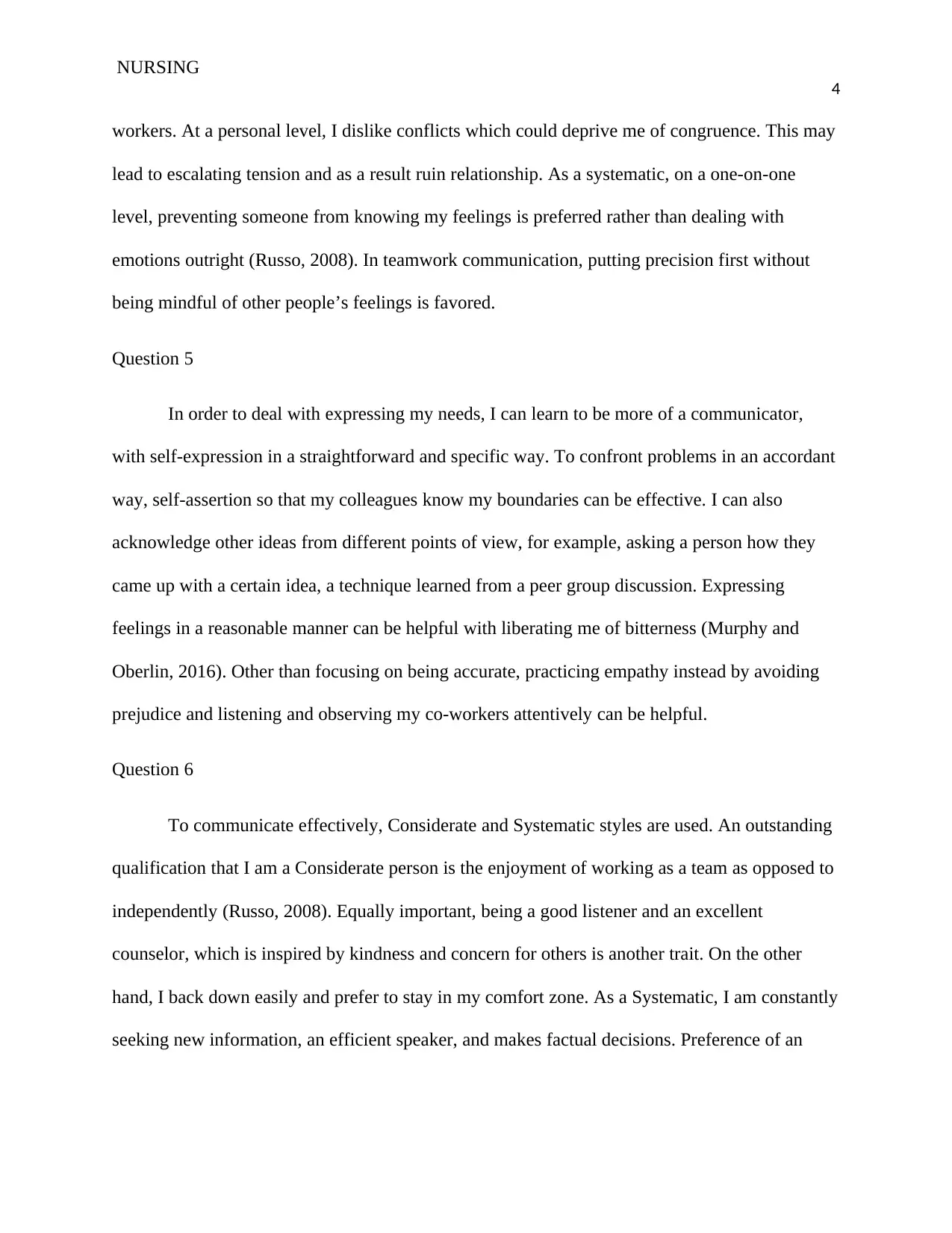
NURSING
4
workers. At a personal level, I dislike conflicts which could deprive me of congruence. This may
lead to escalating tension and as a result ruin relationship. As a systematic, on a one-on-one
level, preventing someone from knowing my feelings is preferred rather than dealing with
emotions outright (Russo, 2008). In teamwork communication, putting precision first without
being mindful of other people’s feelings is favored.
Question 5
In order to deal with expressing my needs, I can learn to be more of a communicator,
with self-expression in a straightforward and specific way. To confront problems in an accordant
way, self-assertion so that my colleagues know my boundaries can be effective. I can also
acknowledge other ideas from different points of view, for example, asking a person how they
came up with a certain idea, a technique learned from a peer group discussion. Expressing
feelings in a reasonable manner can be helpful with liberating me of bitterness (Murphy and
Oberlin, 2016). Other than focusing on being accurate, practicing empathy instead by avoiding
prejudice and listening and observing my co-workers attentively can be helpful.
Question 6
To communicate effectively, Considerate and Systematic styles are used. An outstanding
qualification that I am a Considerate person is the enjoyment of working as a team as opposed to
independently (Russo, 2008). Equally important, being a good listener and an excellent
counselor, which is inspired by kindness and concern for others is another trait. On the other
hand, I back down easily and prefer to stay in my comfort zone. As a Systematic, I am constantly
seeking new information, an efficient speaker, and makes factual decisions. Preference of an
4
workers. At a personal level, I dislike conflicts which could deprive me of congruence. This may
lead to escalating tension and as a result ruin relationship. As a systematic, on a one-on-one
level, preventing someone from knowing my feelings is preferred rather than dealing with
emotions outright (Russo, 2008). In teamwork communication, putting precision first without
being mindful of other people’s feelings is favored.
Question 5
In order to deal with expressing my needs, I can learn to be more of a communicator,
with self-expression in a straightforward and specific way. To confront problems in an accordant
way, self-assertion so that my colleagues know my boundaries can be effective. I can also
acknowledge other ideas from different points of view, for example, asking a person how they
came up with a certain idea, a technique learned from a peer group discussion. Expressing
feelings in a reasonable manner can be helpful with liberating me of bitterness (Murphy and
Oberlin, 2016). Other than focusing on being accurate, practicing empathy instead by avoiding
prejudice and listening and observing my co-workers attentively can be helpful.
Question 6
To communicate effectively, Considerate and Systematic styles are used. An outstanding
qualification that I am a Considerate person is the enjoyment of working as a team as opposed to
independently (Russo, 2008). Equally important, being a good listener and an excellent
counselor, which is inspired by kindness and concern for others is another trait. On the other
hand, I back down easily and prefer to stay in my comfort zone. As a Systematic, I am constantly
seeking new information, an efficient speaker, and makes factual decisions. Preference of an
Paraphrase This Document
Need a fresh take? Get an instant paraphrase of this document with our AI Paraphraser
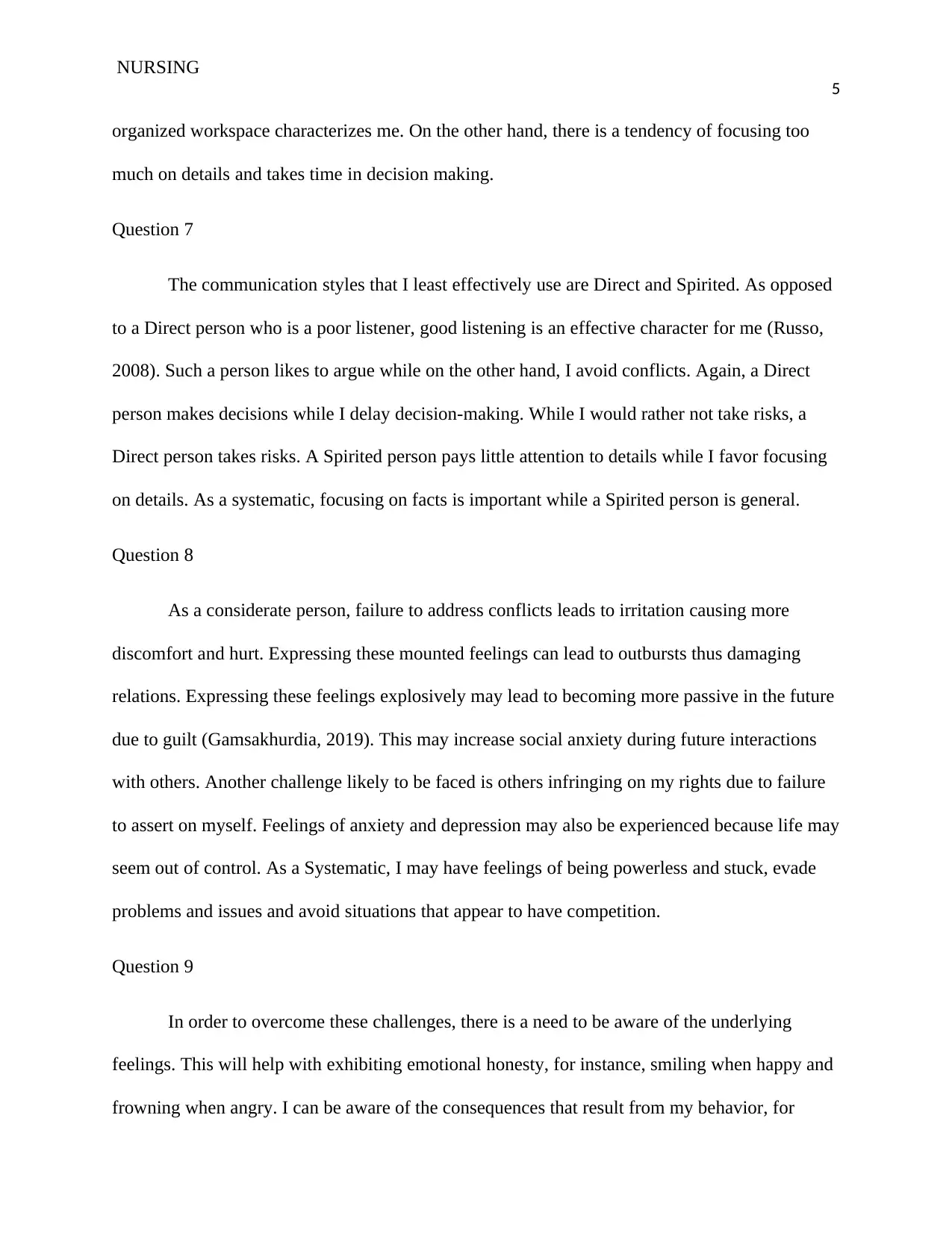
NURSING
5
organized workspace characterizes me. On the other hand, there is a tendency of focusing too
much on details and takes time in decision making.
Question 7
The communication styles that I least effectively use are Direct and Spirited. As opposed
to a Direct person who is a poor listener, good listening is an effective character for me (Russo,
2008). Such a person likes to argue while on the other hand, I avoid conflicts. Again, a Direct
person makes decisions while I delay decision-making. While I would rather not take risks, a
Direct person takes risks. A Spirited person pays little attention to details while I favor focusing
on details. As a systematic, focusing on facts is important while a Spirited person is general.
Question 8
As a considerate person, failure to address conflicts leads to irritation causing more
discomfort and hurt. Expressing these mounted feelings can lead to outbursts thus damaging
relations. Expressing these feelings explosively may lead to becoming more passive in the future
due to guilt (Gamsakhurdia, 2019). This may increase social anxiety during future interactions
with others. Another challenge likely to be faced is others infringing on my rights due to failure
to assert on myself. Feelings of anxiety and depression may also be experienced because life may
seem out of control. As a Systematic, I may have feelings of being powerless and stuck, evade
problems and issues and avoid situations that appear to have competition.
Question 9
In order to overcome these challenges, there is a need to be aware of the underlying
feelings. This will help with exhibiting emotional honesty, for instance, smiling when happy and
frowning when angry. I can be aware of the consequences that result from my behavior, for
5
organized workspace characterizes me. On the other hand, there is a tendency of focusing too
much on details and takes time in decision making.
Question 7
The communication styles that I least effectively use are Direct and Spirited. As opposed
to a Direct person who is a poor listener, good listening is an effective character for me (Russo,
2008). Such a person likes to argue while on the other hand, I avoid conflicts. Again, a Direct
person makes decisions while I delay decision-making. While I would rather not take risks, a
Direct person takes risks. A Spirited person pays little attention to details while I favor focusing
on details. As a systematic, focusing on facts is important while a Spirited person is general.
Question 8
As a considerate person, failure to address conflicts leads to irritation causing more
discomfort and hurt. Expressing these mounted feelings can lead to outbursts thus damaging
relations. Expressing these feelings explosively may lead to becoming more passive in the future
due to guilt (Gamsakhurdia, 2019). This may increase social anxiety during future interactions
with others. Another challenge likely to be faced is others infringing on my rights due to failure
to assert on myself. Feelings of anxiety and depression may also be experienced because life may
seem out of control. As a Systematic, I may have feelings of being powerless and stuck, evade
problems and issues and avoid situations that appear to have competition.
Question 9
In order to overcome these challenges, there is a need to be aware of the underlying
feelings. This will help with exhibiting emotional honesty, for instance, smiling when happy and
frowning when angry. I can be aware of the consequences that result from my behavior, for
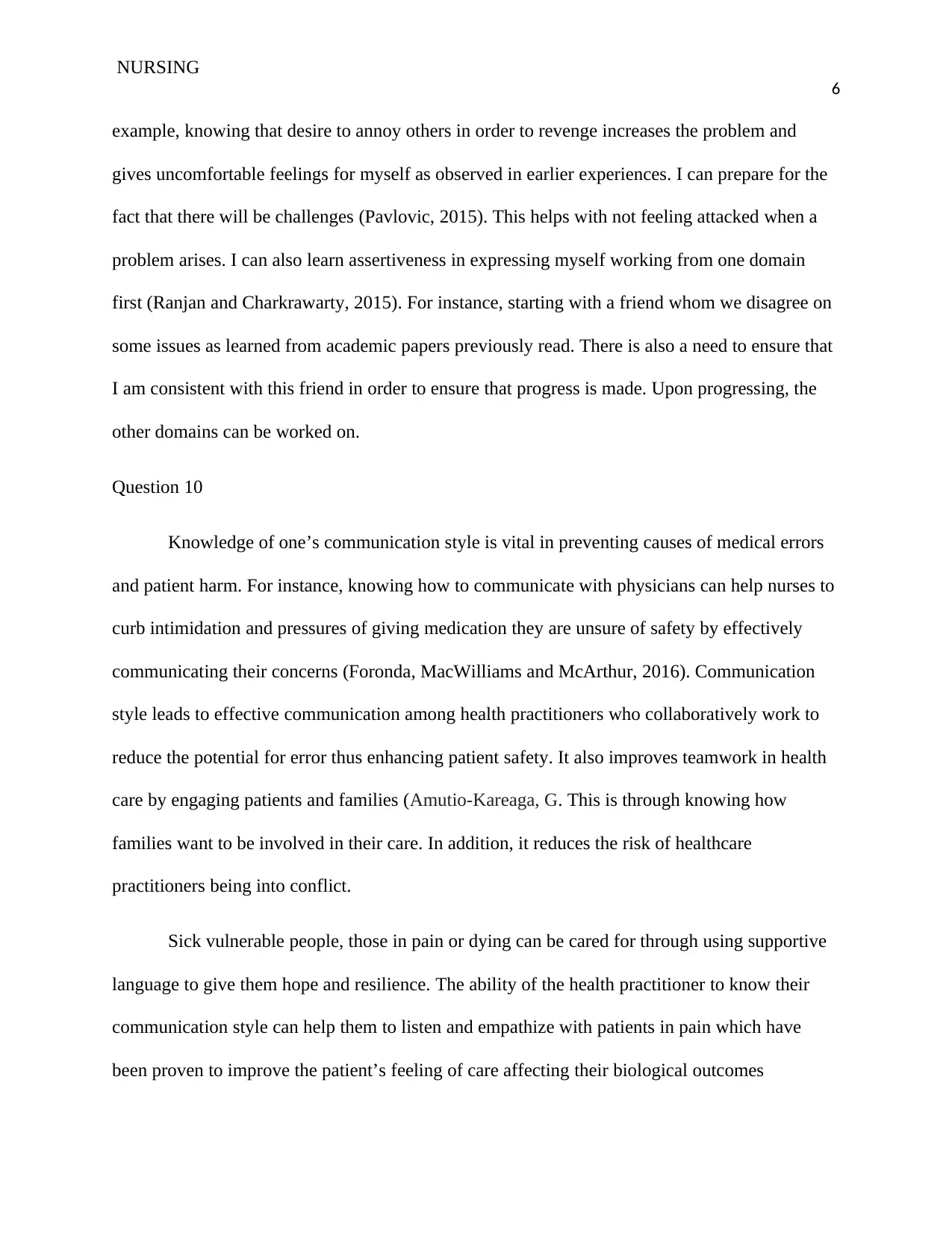
NURSING
6
example, knowing that desire to annoy others in order to revenge increases the problem and
gives uncomfortable feelings for myself as observed in earlier experiences. I can prepare for the
fact that there will be challenges (Pavlovic, 2015). This helps with not feeling attacked when a
problem arises. I can also learn assertiveness in expressing myself working from one domain
first (Ranjan and Charkrawarty, 2015). For instance, starting with a friend whom we disagree on
some issues as learned from academic papers previously read. There is also a need to ensure that
I am consistent with this friend in order to ensure that progress is made. Upon progressing, the
other domains can be worked on.
Question 10
Knowledge of one’s communication style is vital in preventing causes of medical errors
and patient harm. For instance, knowing how to communicate with physicians can help nurses to
curb intimidation and pressures of giving medication they are unsure of safety by effectively
communicating their concerns (Foronda, MacWilliams and McArthur, 2016). Communication
style leads to effective communication among health practitioners who collaboratively work to
reduce the potential for error thus enhancing patient safety. It also improves teamwork in health
care by engaging patients and families (Amutio-Kareaga, G. This is through knowing how
families want to be involved in their care. In addition, it reduces the risk of healthcare
practitioners being into conflict.
Sick vulnerable people, those in pain or dying can be cared for through using supportive
language to give them hope and resilience. The ability of the health practitioner to know their
communication style can help them to listen and empathize with patients in pain which have
been proven to improve the patient’s feeling of care affecting their biological outcomes
6
example, knowing that desire to annoy others in order to revenge increases the problem and
gives uncomfortable feelings for myself as observed in earlier experiences. I can prepare for the
fact that there will be challenges (Pavlovic, 2015). This helps with not feeling attacked when a
problem arises. I can also learn assertiveness in expressing myself working from one domain
first (Ranjan and Charkrawarty, 2015). For instance, starting with a friend whom we disagree on
some issues as learned from academic papers previously read. There is also a need to ensure that
I am consistent with this friend in order to ensure that progress is made. Upon progressing, the
other domains can be worked on.
Question 10
Knowledge of one’s communication style is vital in preventing causes of medical errors
and patient harm. For instance, knowing how to communicate with physicians can help nurses to
curb intimidation and pressures of giving medication they are unsure of safety by effectively
communicating their concerns (Foronda, MacWilliams and McArthur, 2016). Communication
style leads to effective communication among health practitioners who collaboratively work to
reduce the potential for error thus enhancing patient safety. It also improves teamwork in health
care by engaging patients and families (Amutio-Kareaga, G. This is through knowing how
families want to be involved in their care. In addition, it reduces the risk of healthcare
practitioners being into conflict.
Sick vulnerable people, those in pain or dying can be cared for through using supportive
language to give them hope and resilience. The ability of the health practitioner to know their
communication style can help them to listen and empathize with patients in pain which have
been proven to improve the patient’s feeling of care affecting their biological outcomes
⊘ This is a preview!⊘
Do you want full access?
Subscribe today to unlock all pages.

Trusted by 1+ million students worldwide
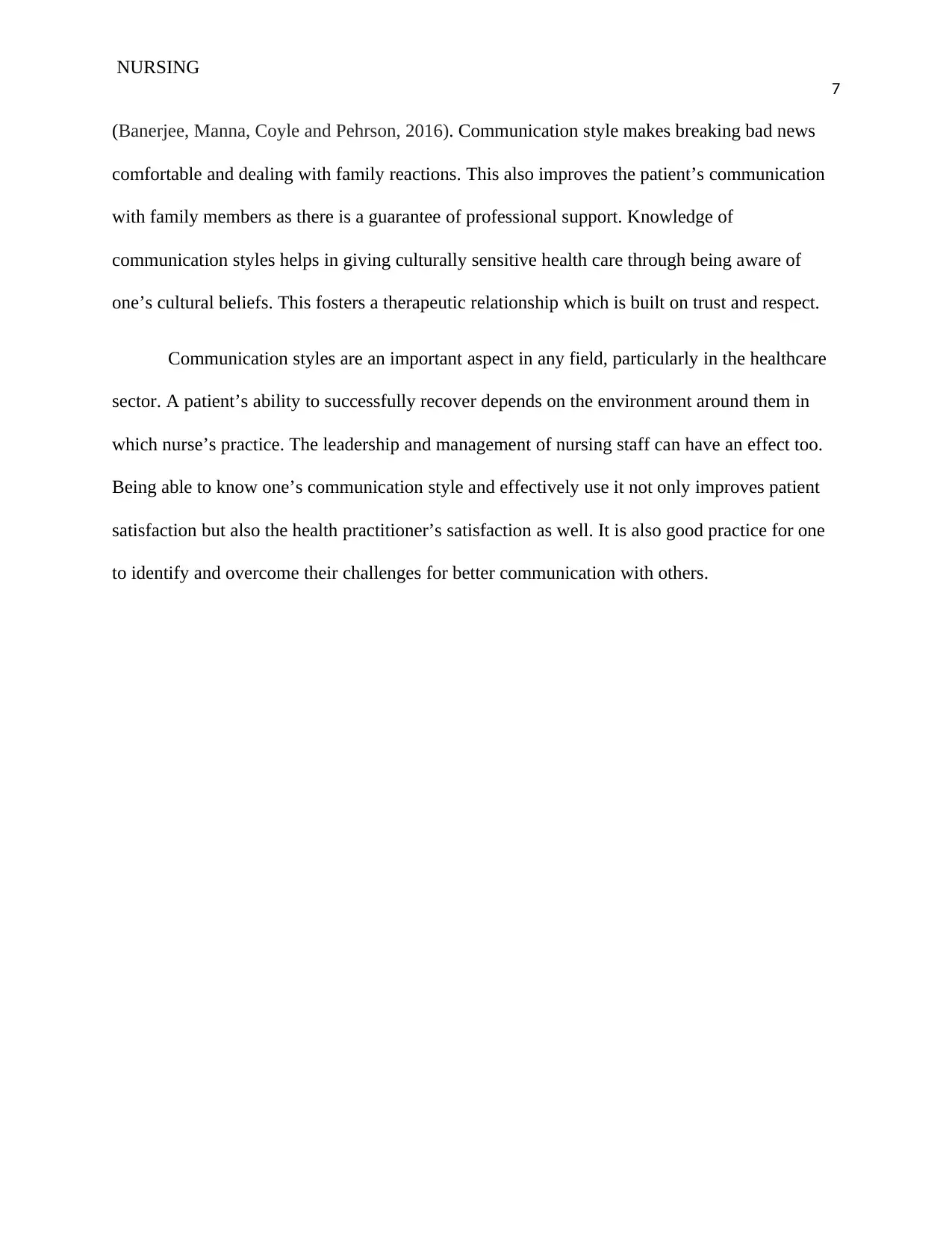
NURSING
7
(Banerjee, Manna, Coyle and Pehrson, 2016). Communication style makes breaking bad news
comfortable and dealing with family reactions. This also improves the patient’s communication
with family members as there is a guarantee of professional support. Knowledge of
communication styles helps in giving culturally sensitive health care through being aware of
one’s cultural beliefs. This fosters a therapeutic relationship which is built on trust and respect.
Communication styles are an important aspect in any field, particularly in the healthcare
sector. A patient’s ability to successfully recover depends on the environment around them in
which nurse’s practice. The leadership and management of nursing staff can have an effect too.
Being able to know one’s communication style and effectively use it not only improves patient
satisfaction but also the health practitioner’s satisfaction as well. It is also good practice for one
to identify and overcome their challenges for better communication with others.
7
(Banerjee, Manna, Coyle and Pehrson, 2016). Communication style makes breaking bad news
comfortable and dealing with family reactions. This also improves the patient’s communication
with family members as there is a guarantee of professional support. Knowledge of
communication styles helps in giving culturally sensitive health care through being aware of
one’s cultural beliefs. This fosters a therapeutic relationship which is built on trust and respect.
Communication styles are an important aspect in any field, particularly in the healthcare
sector. A patient’s ability to successfully recover depends on the environment around them in
which nurse’s practice. The leadership and management of nursing staff can have an effect too.
Being able to know one’s communication style and effectively use it not only improves patient
satisfaction but also the health practitioner’s satisfaction as well. It is also good practice for one
to identify and overcome their challenges for better communication with others.
Paraphrase This Document
Need a fresh take? Get an instant paraphrase of this document with our AI Paraphraser
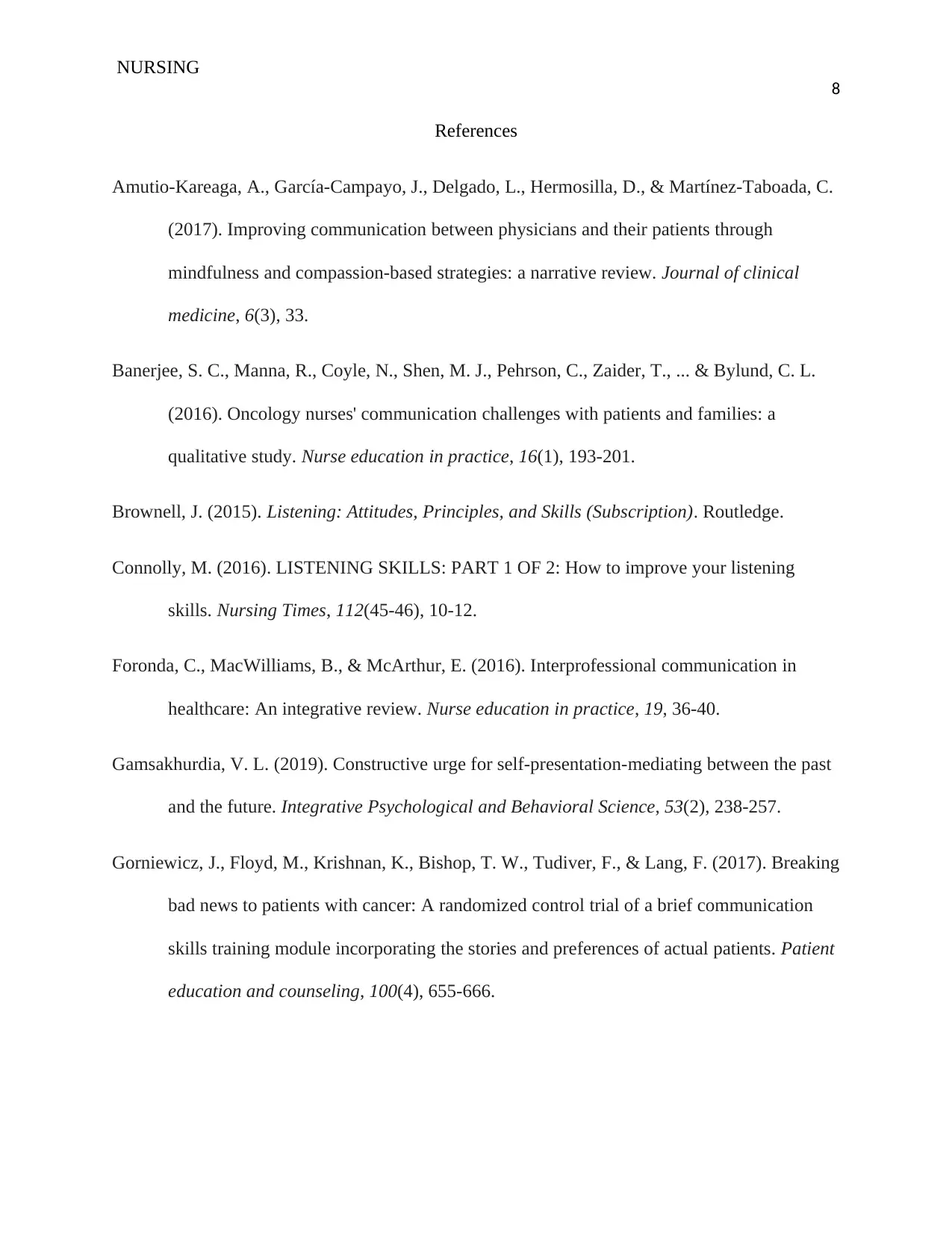
NURSING
8
References
Amutio-Kareaga, A., García-Campayo, J., Delgado, L., Hermosilla, D., & Martínez-Taboada, C.
(2017). Improving communication between physicians and their patients through
mindfulness and compassion-based strategies: a narrative review. Journal of clinical
medicine, 6(3), 33.
Banerjee, S. C., Manna, R., Coyle, N., Shen, M. J., Pehrson, C., Zaider, T., ... & Bylund, C. L.
(2016). Oncology nurses' communication challenges with patients and families: a
qualitative study. Nurse education in practice, 16(1), 193-201.
Brownell, J. (2015). Listening: Attitudes, Principles, and Skills (Subscription). Routledge.
Connolly, M. (2016). LISTENING SKILLS: PART 1 OF 2: How to improve your listening
skills. Nursing Times, 112(45-46), 10-12.
Foronda, C., MacWilliams, B., & McArthur, E. (2016). Interprofessional communication in
healthcare: An integrative review. Nurse education in practice, 19, 36-40.
Gamsakhurdia, V. L. (2019). Constructive urge for self-presentation-mediating between the past
and the future. Integrative Psychological and Behavioral Science, 53(2), 238-257.
Gorniewicz, J., Floyd, M., Krishnan, K., Bishop, T. W., Tudiver, F., & Lang, F. (2017). Breaking
bad news to patients with cancer: A randomized control trial of a brief communication
skills training module incorporating the stories and preferences of actual patients. Patient
education and counseling, 100(4), 655-666.
8
References
Amutio-Kareaga, A., García-Campayo, J., Delgado, L., Hermosilla, D., & Martínez-Taboada, C.
(2017). Improving communication between physicians and their patients through
mindfulness and compassion-based strategies: a narrative review. Journal of clinical
medicine, 6(3), 33.
Banerjee, S. C., Manna, R., Coyle, N., Shen, M. J., Pehrson, C., Zaider, T., ... & Bylund, C. L.
(2016). Oncology nurses' communication challenges with patients and families: a
qualitative study. Nurse education in practice, 16(1), 193-201.
Brownell, J. (2015). Listening: Attitudes, Principles, and Skills (Subscription). Routledge.
Connolly, M. (2016). LISTENING SKILLS: PART 1 OF 2: How to improve your listening
skills. Nursing Times, 112(45-46), 10-12.
Foronda, C., MacWilliams, B., & McArthur, E. (2016). Interprofessional communication in
healthcare: An integrative review. Nurse education in practice, 19, 36-40.
Gamsakhurdia, V. L. (2019). Constructive urge for self-presentation-mediating between the past
and the future. Integrative Psychological and Behavioral Science, 53(2), 238-257.
Gorniewicz, J., Floyd, M., Krishnan, K., Bishop, T. W., Tudiver, F., & Lang, F. (2017). Breaking
bad news to patients with cancer: A randomized control trial of a brief communication
skills training module incorporating the stories and preferences of actual patients. Patient
education and counseling, 100(4), 655-666.
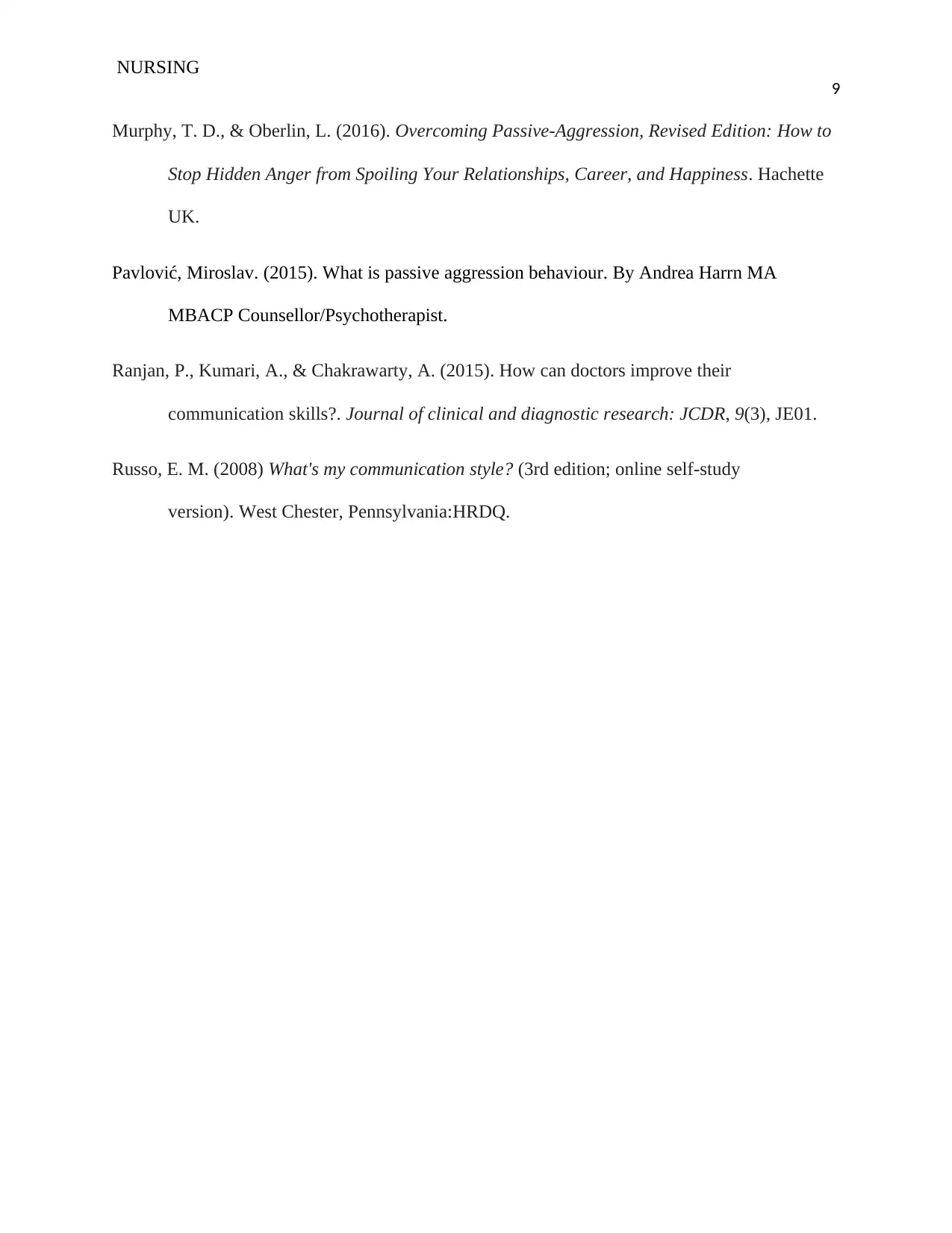
NURSING
9
Murphy, T. D., & Oberlin, L. (2016). Overcoming Passive-Aggression, Revised Edition: How to
Stop Hidden Anger from Spoiling Your Relationships, Career, and Happiness. Hachette
UK.
Pavlović, Miroslav. (2015). What is passive aggression behaviour. By Andrea Harrn MA
MBACP Counsellor/Psychotherapist.
Ranjan, P., Kumari, A., & Chakrawarty, A. (2015). How can doctors improve their
communication skills?. Journal of clinical and diagnostic research: JCDR, 9(3), JE01.
Russo, E. M. (2008) What's my communication style? (3rd edition; online self-study
version). West Chester, Pennsylvania:HRDQ.
9
Murphy, T. D., & Oberlin, L. (2016). Overcoming Passive-Aggression, Revised Edition: How to
Stop Hidden Anger from Spoiling Your Relationships, Career, and Happiness. Hachette
UK.
Pavlović, Miroslav. (2015). What is passive aggression behaviour. By Andrea Harrn MA
MBACP Counsellor/Psychotherapist.
Ranjan, P., Kumari, A., & Chakrawarty, A. (2015). How can doctors improve their
communication skills?. Journal of clinical and diagnostic research: JCDR, 9(3), JE01.
Russo, E. M. (2008) What's my communication style? (3rd edition; online self-study
version). West Chester, Pennsylvania:HRDQ.
⊘ This is a preview!⊘
Do you want full access?
Subscribe today to unlock all pages.

Trusted by 1+ million students worldwide
1 out of 9
Related Documents
Your All-in-One AI-Powered Toolkit for Academic Success.
+13062052269
info@desklib.com
Available 24*7 on WhatsApp / Email
![[object Object]](/_next/static/media/star-bottom.7253800d.svg)
Unlock your academic potential
Copyright © 2020–2026 A2Z Services. All Rights Reserved. Developed and managed by ZUCOL.





